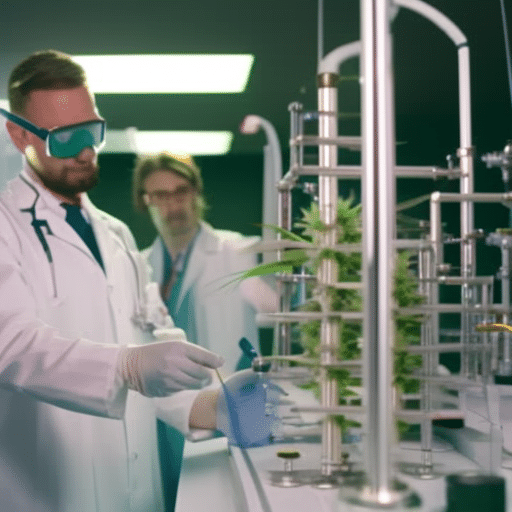The principle that ‘prevention is better than cure’ resonates profoundly within Delaware’s approach to cannabis regulation, and for good reason. The state’s legislative framework is designed to bolster public health through nine strategic measures. These regulations play a critical role in diminishing the illicit cannabis market while establishing rigorous safety protocols.
Moreover, they serve as a safeguard for the younger population, ensuring their health and safety are not compromised. This analysis delves into the comprehensive impact of such regulations on individuals and the wider Delaware community.
Residents must stay informed about these legislative advancements, recognizing that regulation transcends mere governance; it embodies the collective commitment to the health and prosperity of Delaware society.
1. Reducing Illicit Market Activity

You’ll notice a marked decrease in illicit market activity as Delaware’s cannabis regulations funnel consumers towards legitimate, monitored dispensaries. This shift in market dynamics isn’t just about changing where people buy cannabis; it’s about ensuring what they purchase is safe and regulated.
By focusing on consumer education, the state can highlight the risks associated with unregulated products, including potential exposure to harmful substances. As consumers become more informed, they’re likely to make choices that align with their health and safety.
This doesn’t only undermine the illicit market but also supports public health objectives. Evidence suggests that when people understand the benefits of regulated cannabis, including consistent quality and purity, they’re less likely to turn to underground sources, further destabilizing the illicit trade.
2. Quality Control Standards

Building on the reduction of illicit market activity, you’ll find that Delaware’s stringent quality control standards for cannabis ensure that products aren’t only legal but also safe and consistent in potency. These standards are fundamental in fostering consumer trust and product transparency.
As you delve into the specifics, you’ll see that each cannabis product undergoes rigorous testing for contaminants like pesticides, heavy metals, and mold. Additionally, accurate labeling of THC and CBD content is mandatory, which lets you know exactly what you’re consuming.
This meticulous approach not only protects public health but also elevates the overall market quality. By prioritizing these measures, Delaware is setting a precedent for the responsible integration of cannabis into the community, ensuring that public health remains at the forefront of its regulatory framework.
3. Public Safety Protocols

Delaware’s cannabis regulations also zero in on public safety protocols, ensuring you’re protected from potential hazards associated with cannabis use and distribution.
Driving regulations are a critical aspect of these protocols. Evidence shows that cannabis can impair motor skills and reaction times, so Delaware has strict laws to prevent driving under the influence of cannabis, aligning with the state’s commitment to road safety.
Consumption enforcement is another key area. Law enforcement officials are trained to identify and address public consumption, which remains illegal. These regulations are designed not only to discourage unsafe behavior but also to mitigate the risks of secondhand exposure in public spaces.
4. Access to Medicinal Use

In Delaware, regulations facilitate access to cannabis for medicinal purposes, ensuring patients can obtain the relief they need without undue barriers.
Understanding how this affects you involves looking at:
- Patient Rights: You’re empowered with the right to use cannabis as prescribed by a healthcare professional. This includes protection from discrimination for lawful medicinal use.
- Certification Process: A streamlined process exists for obtaining a medical marijuana card, minimizing wait times and bureaucratic hurdles.
- Dosing Guidance: Clear dosing guidance is provided to practitioners, which they then communicate to you, ensuring safe and effective use.
5. Impact on Youth Consumption

Despite the benefits for registered patients, you might wonder how the regulation of cannabis affects youth consumption in Delaware. Education initiatives play a pivotal role in shaping consumption trends among young people. When cannabis is regulated, authorities have a better chance to implement comprehensive educational programs. These initiatives are designed to inform youth about the potential risks and responsible behaviors associated with cannabis use.
Analyzing the data, the impact of regulation on youth consumption trends becomes clearer. Evidence suggests that with proper regulation and education, there’s often a decrease in illicit use among minors, as legal barriers and targeted messaging dissuade underage consumption.
However, continuous monitoring and adaptive strategies are crucial to ensure these trends don’t reverse, and education initiatives remain effective in mitigating youth consumption in Delaware.
Frequently Asked Questions
How Does Cannabis Regulation in Delaware Address the Potential for Increased Driving Under the Influence (DUI) Incidents?
In Delaware, cannabis regulation includes road safety measures and substance testing to mitigate DUI risks. You’ll find strict enforcement and educational campaigns aimed at preventing impaired driving and ensuring public safety.
What Are the Measures Taken by Delaware to Ensure Environmental Sustainability in Cannabis Cultivation and Production?
You’d be intrigued to know Delaware mandates strict water conservation in cannabis farming, ensuring a sustainable approach. Pesticide control is rigorously enforced to minimize environmental impact, reflecting an evidence-based, analytical commitment to eco-responsibility.
How Is Cannabis Tax Revenue in Delaware Specifically Allocated to Support Public Health Initiatives?
You’ll find Delaware’s cannabis tax revenue is allocated to support various public programs, aiming to bolster health initiatives with evidence-based strategies for community wellness and preventative care.
In What Ways Does Delaware’s Cannabis Regulation Include Education and Resources for Addiction and Substance Abuse Treatment?
Delaware’s cannabis regulations mandate youth education initiatives and fund recovery programs, ensuring you’re informed about addiction risks and have access to substance abuse treatment resources. This approach helps mitigate potential harms effectively.
What Steps Has Delaware Taken to Ensure Equitable Business Opportunities in the Cannabis Industry for Historically Marginalized Communities?
Delaware’s taken steps to foster social equity and community development in the cannabis industry by creating programs aimed at supporting business ownership among historically marginalized groups, ensuring fair access to market opportunities.
Conclusion
The state of Delaware has taken a significant step forward by implementing cannabis regulations, a move that has far-reaching implications for public health.
This strategic shift aims to undermine the illegal market by setting rigorous quality control benchmarks, ensuring that cannabis products meet high safety standards.
Additionally, these regulations facilitate access to medicinal cannabis for patients in need, while also instituting protocols to safeguard the community.
It’s particularly important to monitor and potentially curtail youth engagement with cannabis, promoting responsible use.
The overarching goal of these regulations is to enhance public health outcomes, as supported by emerging evidence.
It’s crucial to remain vigilant and maintain a balance between accessibility and regulation.
The post 5 Best Ways Cannabis Regulation Impacts Delaware Public Health appeared first on Delaware Cannabis Docs.
source https://delawarecannabisdocs.com/5-best-ways-cannabis-regulation-impacts-delaware-public-health/

No comments:
Post a Comment